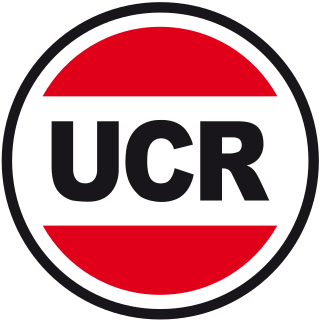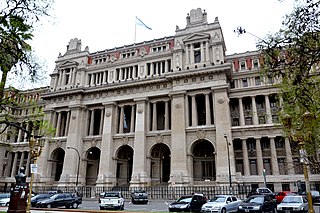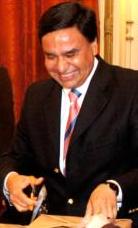
Carlos Saúl Menem was an Argentine lawyer and politician who served as the president of Argentina from 1989 to 1999. Ideologically,he identified as a Peronist and supported economically liberal policies. He led Argentina as president during the 1990s and implemented a free market liberalization. He served as President of the Justicialist Party for thirteen years,and his political approach became known as Menemism.
The politics of Argentina take place in the framework of what the Constitution defines as a federal presidential representative democratic republic,where the President of Argentina is both Head of State and Head of Government. Legislative power is vested in the two chambers of the Argentine National Congress. The Judiciary is independent,as are the Executive and the Legislature. Elections take place regularly on a multi-party system.

Eduardo Alberto Duhalde is an Argentine former peronist politician who served as the interim President of Argentina from January 2002 to May 2003. He also served as Vice President and Governor of Buenos Aires in the 1990s.

Néstor Carlos Kirchner Ostoić was an Argentine lawyer and politician who served as the President of Argentina from 2003 to 2007. A member of the Justicialist Party,he previously served as Governor of Santa Cruz Province from 1991 to 2003,and mayor of Río Gallegos from 1987 to 1991. He later served as the first ever First Gentleman of Argentina during the first tenure of his wife,Cristina Fernández de Kirchner Ideologically,he identified himself as a Peronist and a progressive,with his political approach called Kirchnerism.

Adolfo Rodríguez Saá is an Argentine Peronist politician. Born in a family that was highly influential in the history of the San Luis Province,he became the province's governor in 1983,after the end of the National Reorganization Process military dictatorship. He remained governor up to 2001,being re-elected in successive elections.

Fernando de la Rúa was an Argentine politician and a member of the Radical Civic Union (UCR) political party who served as President of Argentina from 10 December 1999 to 21 December 2001. De la Rúa was born in Córdoba;he entered politics after graduating with a degree in law. He was elected senator in 1973 and unsuccessfully ran for the office of Vice President as Ricardo Balbín's running mate the same year. He was re-elected senator in 1983 and 1993,and as deputy in 1991. He unsuccessfully opposed the pact of Olivos between President Carlos Menem and party leader Raúl Alfonsín,which enabled the 1994 amendment of the Argentine Constitution and the re-election of Menem in 1995.

Raúl Ricardo Alfonsín was an Argentine lawyer and statesman who served as President of Argentina from 10 December 1983 to 8 July 1989. He was the first democratically elected president after the 7-years National Reorganization Process. Ideologically,he identified as a radical and a social democrat,serving as the leader of the Radical Civic Union from 1983 to 1991,1993 to 1995,1999 to 2001,with his political approach being known as "Alfonsinism".

The Justicialist Party is a major political party in Argentina,and the largest branch within Peronism.

The Radical Civic Union is a centrist and liberal political party in Argentina. It has been ideologically heterogeneous,ranging from conservatism to social democracy,but since 1995 it has been a member of the Socialist International.

The Supreme Court of Argentina,officially known as the Supreme Court of Justice of the Argentine Nation,is the highest court of law of the Argentine Republic. It was inaugurated on 15 January 1863. However,during much of the 20th century,the Court and the Argentine judicial system in general,lacked autonomy from the executive power. The Court was reformed in 2003 by the decree 222/03.
The Olivos Pact refers to a series of documents signed on 17 November 1993,between the governing President of Argentina,Carlos Menem,and former President and leader of the opposition UCR,Raúl Alfonsín,that formed the basis of the constitutional reform of 1994. These memorandum of understanding were signed in the official presidential residence,the Quinta de Olivos.

The Front for Victory was a centre-left Peronist electoral alliance in Argentina,and is formally a faction of the Justicialist Party. Former presidents Néstor Kirchner and Cristina Fernández de Kirchner were elected as representatives of this party.

Ángel Eduardo Maza is an Argentine Justicialist Party (PJ) politician. He was the governor of La Rioja Province during several terms,until he was ousted by impeachment in 2007. His sister,Ada Maza,is a national senator.
The Alliance for Work,Justice and Education,also known as Alliance was a political coalition in Argentina in the early 21st century. It was born from the alliance of the Radical Civic Union,the Front for a Country in Solidarity (FREPASO) and several smaller provincial parties in 1997. Initially center-left,before long conservative sectors took over the coalition. The Alliance disintegrated in the aftermath of the December 2001 riots,with its members returning to their former parties or finding new ones.

Antonio Francisco Cafiero was an Argentine Justicialist Party politician. Cafiero held a number of important posts throughout his career,including,most notably,the governorship of Buenos Aires Province from 1987 to 1991,the Cabinet Chief's Office under interim president Eduardo Camaño from 2001 to 2002,and a seat in the Senate of the Nation from 1993 to 2005.
A Necessity and Urgency Decree is a special kind of order issued by the President of Argentina. Unlike regular decrees,which are used in Argentina for rulemaking,a DNU has the force of law. Once the President promulgates a DNU,it comes into force almost immediately;afterwards,the National Congress must examine the decree to determine whether it will be allowed to remain in force or not.

Federal Peronism,also known as Dissident Peronism,is the faction or branch of either moderate,centrist or right-wing Peronism,that is currently identified mostly by its opposition to Kirchnerism,the left-wing faction of Peronism.

The Presidency of Néstor Kirchner began on 25 May 2003,when Néstor Kirchner became President of Argentina. He was the Governor of Santa Cruz during the 2003 general election,he was elected second to Carlos Menem but became president when Menem refused to go for a required runoff election. In elections of October 2007,he declined for a second term and was later succeeded by his wife,Cristina Fernández de Kirchner as President.

Eduardo Bauzá was an Argentine lawyer and politician who served as Minister of Health and Minister of the Interior during Carlos Menem's presidency and was later the first Chief of the Cabinet of Ministers. He was member of the Argentine Senate from 5 June 1996 to 10 December 1999.














